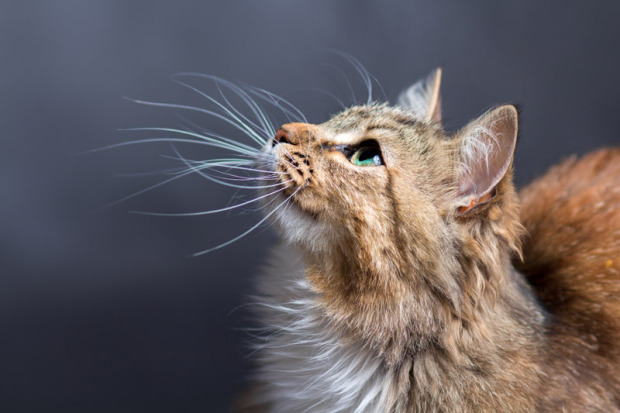The Long and Short on Whiskers

Our feline friends have up to 24 longer whiskers on their muzzle and have shorter ones just above their eyes. Ever wonder what cats use their whiskers for? They also have whiskers on their chin and on the back of their front legs just above their paws. Their whiskers are almost as important to them as our eyesight and sense of touch is to us. Indoor and outdoor cats get valuable information about their daytime and nighttime activities from their whiskers. Whiskers on cats are called "vibrissae" (plural) and "vibrissa" (singular) and are extremely sensitive.
What functions do the whiskers perform?
A cat's whiskers are like tiny radar detectors or "curb feelers" (you probably won't get this one if you aren't at least 45-50 years old). They are twice as thick and coarser than the cat's hair.
Whiskers are set 3 times deeper than their fur and have blood vessels that make them very receptive to movement. When air moves over their whiskers, the whiskers vibrate, which stimulates the nerves. Since their whiskers are about as long as the cats are wide, they will "tell" cats if they can fit into a narrow opening or not and protect their face and eyes.
Can they help with hunting or getting around in the dark?

Because a cat's whiskers are so sensitive, they are able to detect changes in air flow and air currents which helps them navigate in the dark. Cats in the outdoors get help in escaping from predators from their whiskers since they can determine changes in the air around them.
Whiskers also keep our kitties from crashing into furniture, bumping into walls and falling down stairs at night. Also, when cats are engaged in hunting prey, they are usually completely focused on the mouse, some bird feathers or - your foot!
Why should people never cut their cat's whiskers?
It can take two or three months for a cat's whiskers to grow back. And, without their whiskers, cats can become very stressed, scared and sometimes disoriented. They can start acting dizzy and/or confused because they aren't receiving their navigation signals---their radar system is "down" until their whiskers get close to being fully grown back.
What do eye whiskers do?
Whiskers on the cat's eyebrows will trigger a protective blink, when necessary, to protect them from getting poked in the eyes. Eyebrow whiskers act as another set of eyes when your cat is focused on something else, like prey.
A few fun facts about whiskers:
- Sometimes you might notice a white whisker on your solid back cat. This can happen when your cat gets closer to being a senior kitty, around 8-10 years old.
- Whiskers can be an emotional barometer of your cat's mood. If her whiskers are relaxed or sticking out sideways, she is calm. If they are pushed forward, she is excited and alert.
- If they are flattened against her cheeks, she might be angry or scared.